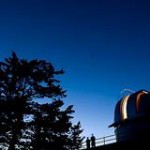Category Science & Technology
Historic Washburn Observatory prepares to reopen
The Washburn Observatory, the University of Wisconsin–Madison's gate to the heavens, will open later this month following a careful two-year renovation that preserved its hilltop charm and historic significance.
Monkeys get a groove on, but only to monkey music
Music is one of the surest ways to influence human emotions; most people unconsciously recognize and respond to music that is happy, sad, fearful or mellow. But psychologists who have tried to trace the evolutionary roots of these responses usually hit a dead end. Nonhuman primates scarcely respond to human music, and instead prefer silence.
UW-Madison’s ‘good ideas’ get lift from stimulus funds
The university has drawn more than $38 million in funding for more than 120 research projects and programs from the American Recovery and Reinvestment Act. The work is spread across the range of academic disciplines, including public health, computer science, psychology, economics and engineering. Funding comes from agencies such as NSF, the National Institutes of Health (NIH), the Department of Energy and the National Endowment for the Arts.
Snaring bigger bugs gave flytraps evolutionary edge
Carnivorous plants defy our expectations of how plants should behave, with Venus flytraps employing nerve-like reflexes and powerful digestive enzymes to capture and consume fresh meat. The evolutionary history of these botanical oddities is now a bit clearer, thanks to new work.
Wisconsin team grows retina cells from skin-derived stem cells
A team of scientists from the University of Wisconsin–Madison School of Medicine and Public Health has successfully grown multiple types of retina cells from two types of stem cells - suggesting a future in which damaged retinas could be repaired by cells grown from the patient's own skin.
A new ‘bent’ on fusion
Success in cellular fusion - as occurs at the moment of conception and when nerve cells exchange neurotransmitters - requires that a membrane be bent before the merging process can begin, University of Wisconsin–Madison researchers have shown.
Late blight pathogen spreads to state’s potato crop
The plant pathogen best known for causing the Irish potato famine - Phytophthora infestans - was just discovered in two commercial potato fields in two separate Wisconsin counties. Before this, the outbreak of late blight, as the disease is known, had been confined to tomato plants.
New approach to wound healing may be easy on skin, but hard on bacteria
In a presentation today (Aug. 19) to the American Chemical Society meeting, Ankit Agarwal, a postdoctoral researcher at the University of Wisconsin–Madison, described an experimental approach to wound healing that could take advantage of silver's anti-bacterial properties, while sidestepping the damage silver can cause to cells needed for healing.
Engineered protein-like molecule protects cells against HIV infection
With the help of the human immunodeficiency virus (HIV) and molecular engineering, researchers have designed synthetic protein-like mimics convincing enough to interrupt unwanted biological conversations between cells.
Future angst? Brain scans show uncertainty fuels anxiety
Anyone who has spent a sleepless night anguishing over a possible job loss has experienced the central finding of a new brain scan study: Uncertainty makes a bad event feel even worse.
Curiosities: How big is space?
Space is probably infinite, but we can see only the part that contains stars or galaxies whose light has been able to reach us, says…
Scientists make multiple types of white blood cells directly from embryonic and adult stem cells
In an advance that could help transform embryonic stem cells into a multipurpose medical tool, scientists at the University of Wisconsin–Madison have transformed these versatile cells into progenitors of white blood cells and into six types of mature white blood and immune cells.
Curiosities: How long can bacteria live outside humans?
Bacteria have vastly different survival abilities, says Jeri Barak, an assistant professor of plant pathology at UW–Madison. Many species normally live in soil…
GLBRC receives $8 million in Recovery Act funding
The Department of Energy (DOE) Great Lakes Bioenergy Research Center (GLBRC) has received $8.099 million in new funding from the U.S. Department of Energy through the American Recovery and Reinvestment Act to provide crucial support for plant cell wall imaging and sustainability research.
Curiosities: How many galaxies have humans discovered?
“We don’t know,” says Ed Churchwell, professor of astronomy. “We know it’s a very large number.” It’s in the hundreds of billions, Churchwell…
Team discovers gene for age-related cataracts
Participants in the University of Wisconsin–Madison's long-running Beaver Dam Eye Study have contributed to the discovery of a gene involved in cataracts in both aging humans and in mice.
Will a well-mixed, warmer lake doom invasive fish?
The rainbow smelt, an invasive fish that threatens native species such as walleye and perch, may soon be feeling the heat - literally.












